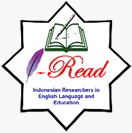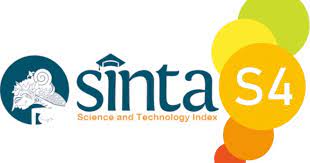Increasing the motivation of madrasah Aliyah students to learn cross-interest English subject by applying the game “relay race”
DOI:
https://doi.org/10.22219/englie.v5i1.31965Keywords:
Cross-Interest English Subject, Relay Race, Learning MotivationAbstract
Cross-interest subjects are programs and policies from the government that aim to provide opportunities for students to choose and study subjects that are not in the specialization program so that they will add insight, experience, and knowledge that they have later. In theory, students should have a high motivation or enthusiasm for learning to study the cross-interest subjects they have chosen. However, the facts in the classroom show the opposite. This study aims to increase student learning motivation in English Cross Interest subjects in class XI MIPA Madrasah Aliyah Negeri Kota Batu through the application of a "relay race" or relay game. This research is a class action research with the research subject of XI MIPA 2 class with 36 students. The research was conducted with two cycles on simple past-tense material. Data collection techniques were carried out by observation through daily notes filled by both the teacher and students, and questionnaires filled by students to determine the level of student learning motivation. The results showed increased student learning motivation in cross-interest English subjects, with an average percentage in the first cycle of 81% and increased by 1% to 82% in the second cycle. Thus, it can be concluded that applying the "relay race" game can increase students' learning motivation while still paying attention to the teacher’s pedagogical skills during the learning process.
Downloads
References
Agustriani, L., Verdha, L., Fajar, M., Inshi, M., Farihin, M., Salman, M., Rama, M., Shofia, N., Silvia, N., Fathurrahman, N., & Herdiana, D. (2022). Sosialisasi Nilai-nilai Pancasila Melalui Permainan Kerjasama Tim kepada Anak-anak. Bubungan Tinggi: Jurnal Pengabdian Masyarakat, 4(1), 150. https://doi.org/10.20527/btjpm.v4i1.4765
Anastasiadis, T., Lampropoulos, G., & Siakas, K. (2018). Digital Game-based Learning and Serious Games in Education. International Journal of Advances in Scientific Research and Engineering, 4(12), 139–144. https://doi.org/10.31695/ijasre.2018.33016
Arikunto, S., Suhardjono, & Supardi. (2015). Penelitian Tindakan Kelas. In Bumi Aksara (Edisi Revi). Bumi Aksara.
Arman, A., Rianto, S., & Yuherman, Y. (2022). Perbandingan Aktivitas Belajar Geografi Antara Siswa Kelas Xi Kelompok Peminatan Dengan Lintas Minat Di Sma Negeri 1 Tigo Nagari. Jambura Geo Education Journal, 3(1), 1–10. https://doi.org/10.34312/jgej.v3i1.11735
Bardach, L., & Klassen, R. M. (2020). Smart teachers, successful students? A systematic review of the literature on teachers’ cognitive abilities and teacher effectiveness. Educational Research Review, 30(January), 100312. https://doi.org/10.1016/j.edurev.2020.100312
Barlian, U. C., Solekah, S., & Rahayu, P. (2022). Implementasi Kurikulum Merdeka dalam meningkatkan mutu pendidikan. JOEL: Journal of Education and Language Research, 1(12), 1–14. https://doi.org/https://doi.org/10.53625/joel.v1i12
Borah, M. (2021). Motivation in learning. Journal of Critical Reviews, 8 (02), 550–552. https://doi.org/https://www.jcreview.com/admin/Uploads/Files/61c1acf9cfb5a1.40236533.pdf
Dalyono, M. (2009). Psikologi Pendidikan (5th ed.). Rineka Cipta.
Darmayanti, N., Halimah, S., & Riza, M. F. (2021). Makna peminatan akademik bagi peserta didik di SMA Negeri 1 Sei Suka Kabupaten Batu Bara. Research and Development Journal of Education, 7(2), 252. https://doi.org/10.30998/rdje.v7i2.8664
Emda, A. (2018). Kedudukan motivasi belajar siswa dalam pembelajaran. Lantanida Journal, 5(2), 172. https://doi.org/10.22373/lj.v5i2.2838
Fajri, Z., Baharun, H., Muali, C., Shofiatun, Farida, L., & Wahyuningtiyas, Y. (2021). Student’s learning motivation and interest; the effectiveness of online learning during COVID-19 pandemic. Journal of Physics: Conference Series, 1899(1). https://doi.org/10.1088/1742-6596/1899/1/012178
Faradita, M. N., & Afiani, K. D. A. (2021). Pelatihan pembuatan RPP kurikulum darurat pada masa pandemi Covid-19. Jurnal Altifani Penelitian Dan Pengabdian Kepada Masyarakat, 1(3), 258–266. https://doi.org/10.25008/altifani.v1i3.166
H.M. Syarafudin dan Hastuti Diah Ikawati. (2020). Faktor-faktor yang mempengaruhi profesionalisme guru. Jurnal Cahaya Mandalika, 1(2), 47–51. https://doi.org/10.36312/jcm.v1i2.87
Hafizha, D., Ananda, R., & Aprinawati, I. (2022). Analisis pemahaman guru terhadap gaya belajar siswa di SDN 020 Ridan Permai. Jurnal Review Pendidikan Dasar : Jurnal Kajian Pendidikan Dan Hasil Penelitian, 8(1), 25–33. https://doi.org/10.26740/jrpd.v8n1.p25-33
Hartanti, D. (2019). Meningkatkan motivasi belajar siswa dengan media pembelajaran interaktif game Kahoot berbasis hypermedia. Prosiding Seminar Nasional PEP, 1(1), 78–85. https://jurnal.ustjogja.ac.id/index.php/snpep2019/article/view/5631
Haryadi, D., & Mahmudah, F. (2021). Implementasi kurikulum darurat Covid-19. Journal EVALUASI, 5(2), 94-110. https://doi.org/10.32478/evaluasi.v5i2.595
Herawati. (2018). Memahami proses belajar anak. Jurnal UIN Ar-Raniry Banda Aceh, IV, 27–48. https://doi.org/http://dx.doi.org/10.22373/bunayya.v4i1.4515
Hidayat, T., Hidayatullah, A., & Agustini, R. (2019). Kajian permainan edukasi dalam pembelajaran Bahasa Indonesia. Deiksis: Jurnal Pendidikan Bahasa Dan Sastra Indonesia, 6(2), 59-68. https://doi.org/10.33603/dj.v6i2.2111
Indriani, L. (2022). Meningkatkan keaktifan dan hasil belajar siswa dengan model problem-based learning pada mata pelajaran Bahasa Inggris. Edukasiana: Jurnal Inovasi Pendidikan, 1(1), 9–17. https://doi.org/https://doi.org/10.56916/ejip.v1i1.4
Islam, S., Baharun, H., Muali, C., Ghufron, M. I., Bali, M. E. I., Wijaya, M., & Marzuki, I. (2018). To Boost Students’ Motivation and Achievement through Blended Learning. Journal of Physics: Conference Series, 1114(1), 1-11. https://doi.org/10.1088/1742-6596/1114/1/012046
Jihan, I., Asbari, M., & Nurhafifah, S. (2023). Quo vadis Pendidikan Indonesia : Kurikulum berubah , pendidikan membaik ? JISMA: Journal of Information Systems and Management, 02(05), 17–23. https://doi.org/https://doi.org/10.4444/jisma.v2i5.431
Khaidir, F., Amran, A., & Noor, I. A. (2023). Peningkatan kualitas pendidikan dasar melalui implementasi Kurikulum Merdeka Belajar dalam mewujudkan suistanable developments goal’s. Attadib: Journal of Elementary Education Vol.7, 7(2), 1–27. https://jurnalfai-uikabogor.org/index.php/attadib/article/view/1944
Laka, B. M., Burdam, J., & Kafiar, E. (2020). Role of parents in improving Geography learning motivation in Immanuel Agung Samofa High School. Jurnal Inovasi Penelitian, 1(2), 69–74. https://doi.org/10.47492/jip.v1i2.51
Malla, H. A. B., & Asrang, A. (2021). Effectiveness study of the Cross-Interest Program in Madrasah Aliyah Negeri (MAN). Jurnal Dikdas, 9(2), 243–251. http://jurnal.untad.ac.id/jurnal/index.php/ESE/article/view/18275
Mandasari, B., Aminatun, D., Ayu, M., Hamzah, I., & Dewi, G. (2022). Pendampingan pembelajaran Bahasa Inggris melalui active learning bagi siswa-siswi. Al-Mu’awanah: Jurnal Pengabdian Kepada Masyarakat, 3(1), 163–170. http://ejournal.radenintan.ac.id/index.php/ajpm/article/view/12134
Manzano-León, A., Camacho-Lazarraga, P., Guerrero, M. A., Guerrero-Puerta, L., Aguilar-Parra, J. M., Trigueros, R., & Alias, A. (2021). Between level up and game over: A systematic literature review of gamification in education. Sustainability (Switzerland), 13(4), 1–14. https://doi.org/10.3390/su13042247
Mardiana, M. (2019). Penerapan metode stad untuk meningkatkan motivasi dan hasil belajar Bahasa Inggris di kelas XI IPA 3 SMA Negeri 1 Bandar Baru. JSH: Jurnal Sosial Humaniora Sigli, 2(1), 13–19. https://doi.org/https://doi.org/10.47647/jsh.v2i1.133
Peraturan Menteri Pendidikan dan Kebudayaan Republik Indonesia Nomor 64 Tahun 2014, Menteri Pendidikan dan Kebudayaan Republik Indonesia (2014). https://jdih.kemdikbud.go.id/sjdih/siperpu/dokumen/salinan/Permen Nomor 64 Tahun 2014.pdf
Miles, M. B., & Huberman, A. M. (1994). Qualitative Data Analysis Qualitative Data. SAGE Publications, Inc.
Moybeka, A. M. S., Bosco, F. H., Apalem, C. R., Chandra, D. A., & Efendi, E. (2023). Developing EFL students’ writing ability through contextual teaching and learning (A Classroom Action Research Study). Journal of English Culture, Language, Literature and Education, 11(1), 79–97. https://doi.org/10.53682/eclue.v11i1.6107
Muhadi. (2011). Penelitian Tindakan Kelas: Panduan Wajib Bagi Pendidik. In Shira Media (1st ed.). Shira Media. https://inlislite.blitarkota.go.id/opac/detail-opac?id=3492
Munir, A., & Karim, A. (2022). Manajemen pembelajaran daring pada masa pandemi di Madrasah Aliyah Wahid Hasyim Balung. Leaderia: Jurnal Manajemen Pendidikan Islam, 3(2), 60–74. https://doi.org/10.35719/leaderia.v3i2.211
Murwindra, R., Yuhelman, N., & Putri Musdansi, D. (2020). Kinerja guru dalam pembelajaran lintas minat kimia sebagai implementasi Kurikulum 2013. JARTIKA : Jurnal Riset Teknologi Dan Inovasi Pendidikan, 3(1), 149–157. https://doi.org/10.36765/jartika.v3i1.30
Nisa, M. A., & Susanto, R. (2022). Pengaruh penggunaan game edukasi berbasis wordwall dalam pembelajaran Matematika terhadap motivasi belajar. JPGI (Jurnal Penelitian Guru Indonesia), 7(1), 140-147. https://doi.org/10.29210/022035jpgi0005
Nisak, K., Ahmadi, A., & Mazidah, N. (2023). Peningkatan keterampilan menulis puisi melalui metode pembelajaran permainan estasi ( Estafet Menulis Puisi ) di Kelas X-5 SMAN 2 Jombang. Sastranesia: Jurnal Pendidikan Bahasa & Sastra Indonesia, 11(2), 120–133. https://doi.org/https://doi.org/10.32682/sastranesia.v11i2.3042
Nugroho, T., & Narawaty, D. (2022). Kurikulum 2013 , Kurikulum Darurat ( 2020-2021 ), dan Kurikulum Prototipe atau Kurikulum Merdeka ( 2022 ) mata pelajaran Bahasa Inggris : Suatu Kajian Bandingan. Sinastra, 1(1), 373–382. http://www.proceeding.unindra.ac.id/index.php/sinastra/article/view/6099
Nurtika, M., & Hasbullah, H. (2021). Pengaruh persepsi atas gaya belajar dan perhatian orang tua terhadap prestasi belajar Bahasa Inggris. INFERENCE: Journal of English Language Teaching, 4(1), 1-9. https://doi.org/10.30998/inference.v4i1.5493
Prabawati, M., & Muhadi, F. (2022). Pengaruh Gaya belajar siswa dan strategi pembelajaran guru terhadap prestasi belajar pada mata pelajaran Ekonomi (Lintas Minat) di SMA Negeri 1 Kalasan. Jurnal Pendidikan Ekonomi Dan Akuntansi, 15(1), 21–29. https://doi.org/10.24071/jpea.v15i1.4603
Pranatawijaya, V. H., Widiatry, W., Priskila, R., & Putra, P. B. A. A. (2019). Penerapan Skala likert dan skala dikotomi pada kuesioner online. Jurnal Sains Dan Informatika, 5(2), 128–137. https://doi.org/10.34128/jsi.v5i2.185
Putri, M. (2018). Pengaruh gaya belajar terhadap pemahaman membaca pada pelajaran Bahasa Inggris. Ensiklopedia of Journal, 1(2), 200–204. https://doi.org/https://doi.org/10.33559/eoj.v1i1.48
Ramadhan, A. H., Fadillah, H., Khaliza, R., & Nasution, I. (2022). Penerapan kurikulum darurat sebagai strategi pendidikan dalam kondisi Pandemic Covid-19. Edumaspul: Jurnal Pendidikan, 6(1), 401–407. https://doi.org/10.33487/edumaspul.v6i1.2383
Riafadilah, A., & Dewi, L. (2019). Evaluasi terhadap implementasi lintas minat dalam kelompok peminatan di SMA/MA Kecamatan Lembang. Jurnal Penelitian Ilmu Pendidikan, 11(2), 129–133. https://doi.org/10.21831/jpipfip.v11i2.19831
Ritonga, M. (2018). Politik dan dinamika kebijakan perubahan kurikulum pendidikan di Indonesia hingga masa reformasi. Bina Gogik, 5(2), 1–15. https://ejournal.stkipbbm.ac.id/index.php/pgsd/article/view/212/199
Rohimajaya, N. A., Hartono, R., Yuliasri, I., & Fitriati, W. (2022). Kurikulum 2013 dan Kurikulum Merdeka dalam Perkembangan Bahasa Inggris untuk SMA di Era Digital. Prosiding Seminar Nasional Pascasarjana, 5(1), 825–829. https://proceeding.unnes.ac.id/index.php/snpasca/article/view/1570
Ruwaidah, R. (2021). Penerapan metode demonstrasi untuk meningkatkan hasil belajar siswa pada mata pelajaran informatika materi operasi dasar komputer di SMAN 4 Kota Bima Kelas X MIPA 1 Semester Ganjil Tahun Pelajaran 2020/2021. Jurnal Pendidikan Dan Pembelajaran Indonesia (JPPI), 1(2), 177–189. https://doi.org/10.53299/jppi.v1i2.51
Setiawati., S. M. (2018). Telaah teoritis: Apa itu belajar? HELPER: Jurnal Penelitian Dan Pembelajaran, 35(1), 32. https://doi.org/10.1093/nq/s10-IV.102.469-f
Suherman, Purnamasari, M., & Hastuti, F. D. (2021). Klasifikasi siswa berdasarkan mata pelajaran lintas minat menggunakan metode decision tree C4.5. JSiI: Jurnal Sistem Informasi, 8(2), 141–149. https://doi.org/https://doi.org/10.30656/jsii.v8i2.3508
Sumarbini, S., & Hasanah, E. (2021). Penerapan kurikulum darurat pada masa Covid-19 Di SMK Muhammadiyah Semin, Yogyakarta. Jurnal Ilmiah Mandala Education, 7(2), 9–18. https://doi.org/10.36312/jime.v7i2.1798
Susilo, H., Chotimah, H., & Sari, Y. D. (2011). Penelitian Tindakan Kelas. Bayumedia Publishing (1st ed.). Bayumedia Publishing.
Syarifah, Isroani, F., Nurhasanah, M., Samsul, & Azwary, K. (2022). Analisis model kurikulum pembelajaran Pendidikan Agama Islam pasca pandemi COVID-19. HIKMAH, 19(2), 202-213. https://doi.org/https://doi.org/10.53802/hikmah.v19i2.180
Toisuta, J. J. (2020). Pengaruh lingkungan kos-kosan terhadap motivasi belajar mahasiswa STAKPN Ambon. Institutio:Jurnal Pendidikan Agama Kristen, 4(2). 47-60. https://doi.org/10.51689/it.v4i2.152
Wahyuningsih, R. (2021). Prestasi belajar siswa : Kompetensi pedagogik guru dan motivasi belajar siswa. Jurnal Paedagogy, 8(2), 117. https://doi.org/10.33394/jp.v8i2.3472
Zidan, M. R., & Qamariah, Z. (2023). A literature study on the implementation of Merdeka Curriculum. Jurnal Riset Rumpun Ilmu Bahasa (JURRIBAH), 2(2), 153–167. https://doi.org/https://doi.org/10.55606/jurribah.v2i2.1576
Downloads
Published
How to Cite
Issue
Section
License
Copyright (c) 2024 Annafiah, A.U.N.

This work is licensed under a Creative Commons Attribution-ShareAlike 4.0 International License.
Authors who publish with English Learning Innovation (englie) agree to the following terms:
- For all articles published in English Learning Innovation (englie), copyright is retained by the authors. Authors give permission to the publisher to announce the work with conditions. When the manuscript is accepted for publication, the authors agree to automatic transfer of the publishing right to the publisher.
- Authors retain copyright and grant the journal right of first publication with the work simultaneously licensed under a Creative Commons Attribution-ShareAlike 4.0 International License that allows others to share the work with an acknowledgement of the work's authorship and initial publication in this journal.
- Authors are able to enter into separate, additional contractual arrangements for the non-exclusive distribution of the journal's published version of the work (e.g., post it to an institutional repository or publish it in a book), with an acknowledgment of its initial publication in this journal.
- Authors are permitted and encouraged to post their work online (e.g., in institutional repositories or on their website) prior to and during the submission process, as it can lead to productive exchanges, as well as earlier and greater citation of published work (See The Effect of Open Access).
This work is licensed under a Creative Commons Attribution-ShareAlike 4.0 International License.
















1.png)












